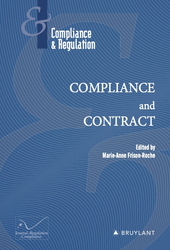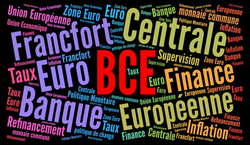Food for thoughts
Compliance and Regulation Law bilingual Dictionnary

The term "breach" is new in Law. In the legal order, the term "fault" is that which is retained to designate the behavior of a person who deviates from a rule and must be sanctioned, because by this act he has manifested a fraudulent intention which may is reproached to him. But the legal notion of fault, which was central in the classic Law of civil liability and was essential in criminal liability Law has the major drawback of calling for proof: that of the intention to "do wrong". This seems all the less adequate when it comes to assessing the behavior of organizations, such as companies, whose behavior and power must be controlled more than the faulty behavior of their leaders sanctioned.
This is why both to lighten the burden of proof concerning natural persons, in particular those with the power and the function of deciding for others (managers, "senior executives") and to better correspond to the distribution of the power of The action, which is now held by organizations, in particular companies, are "failures" and no longer faults or negligence which constitute the triggering events triggering their liability or justifying repression.
It is more particularly an administrative repression, the end of which is not to sanction misconduct but to effectively protect the regulated sectors. The sanction for breaches is therefore both easier, because it is always necessary to prove the intention, and more violent, because the sanctions attached can relate to a share of the profits withdrawn, to a share of the turnover. business of the operator or can take the form of commitments by the operator for the future, a very restrictive and new form of sanction that the compliance technique has inserted into the law.
Thus the breach can be defined as a behavior, even an organization which is away from the behavior or the situation that the author of a text has posed as being that which he posits as adequate. This definition, which is at the same time broad, abstract, teleological and prescription, which makes it possible to apprehend not only behaviors but also structures, makes the sanction of breaches a daily tool of Regulatory Law.
Compliance and Regulation Law bilingual Dictionnary

The procedural guarantees from which the person benefits are mainly the right of action, the rights of defense and the benefit of the adversarial principle.
While the rights of the defense are subjective rights which are advantages given to the person at risk of having his situation affected by the decision that the body which is formally or functionally legally qualified as a "tribunal", may take, the adversarial principle is rather a principle of organization of the procedure, from which the person can benefit.
This principle, as the term indicates, is - as are the rights of the defense - of such a nature as to generate all the technical mechanisms which serve it, including in the silence of the texts, imply a broad interpretation of these.
The adversarial principle implies that the debate between all the arguments, in particular all the possible interpretations, is possible. It is exceptionally and justified, for example because of urgency or a justified requirement of secrecy (professional secrecy, secrecy of private life, industrial secrecy, defense secrecy, etc.) that the adversarial mechanism is ruled out. , sometimes only for a time (technique of deferred litigation by the admission of the procedure on request).
This participation in the debate must be fully possible for the debater, in particular access to the file, knowledge of the existence of the instance, the intelligibility of the terms of the debate, not only the facts, but also the language (translator, lawyer , intelligibility of the subject), but still discussion on the applicable legal rules). So when the court automatically comes under the rules of Law, it must submit them to adversarial debate before possibly applying them.
The application of the adversarial principle often crosses the rights of the defense, but in that it is linked to the notion of debate, it develops all the more as the procedure is of the adversarial type.
Thesaurus : Doctrine
► Référence complète : L. d'Avout, La cohérence mondiale du droit, Cours général de droit international privé, Académie de droit international de La Haye, t.443, 2025, 692 p.
____
Compliance and Regulation Law bilingual Dictionnary

The State's traditional view is that it serves the general interest through its public services, either directly (by its administrations, or even by public enterprises), or by delegation (eg through the concession mechanism). Public service is generally defined in a functional way, ie through public service missions that the organization must perform, such as providing public transport or caring for the population whatever (Eg in France by the public firm the SNCF). The liberalization of those public sectors, the primary reference to the market as a means of achieving the general interest, the primary reference to competition and the play of the European Law has destroyed this intimacy between public service, general interest, public enterprise and State.
Today, in a dialectical game, the Regulation keeps this concern for public service missions in balance with the competition, in a competitive context and under the control of a Regulator. The system is more complex and challenging because it creates new difficulties, such as information asymmetry or less easy integration of long-term planning, but it is better suited to an open and globalized economy.
Thesaurus : Doctrine

► Référence complète : P.-Y. Gautier, « Contre le droit illimité à la preuve devant les autorités administratives indépendantes », Mélanges en l'honneur du Professeur Claude Lucas de Leyssac, LexisNexis, 2018, p.181-193.
____
📘 Lire une présentation générale de l'ouvrage dans lequel l'article est publié
Thesaurus : Soft Law
► Référence complète : Agence française anticorruption (AFA), Guide du contrôle comptable anticorruption, 2022.
____
____
📧 Lire le commentaire fait par Marie-Anne Frison-Roche de ce guide.
_______
Compliance and Regulation Law bilingual Dictionnary

In principle, the very mechanism of the market is governed by freedom, the freedoms of the agents themselves - the freedom to undertake and contract - and the competitive freedom that marks the market itself, the convergence of these freedoms allowing the self-regulated functioning of The "market law", namely the massive encounter of offers and demands that generates the right price ("fair price").
But in the case of financial markets, which are regulated markets, "market abuses" are sanctioned at the very heart of regulation. Indeed, the regulation of the financial markets presupposes that the information is distributed there for the benefit of investors, or even other stakeholders, possibly information not exclusively financial. This integrity of the financial markets which, beyond the integrity of information, must achieve transparency, justifies that information is fully and equally shared. That is why those who hold or must hold information that is not shared by others (privileged information) must not use it in the market until they have made it public. Similarly, they should not send bad information to the market. Neither should they manipulate stock market prices.
These sanctions were essentially conceived by the American financial theory, concretized by the American courts, then taken back in Europe. To the extent that they sanction both reproachable behavior and constitute a public policy instrument of direction and protection of markets, the question of cumulation of criminal law and administrative repressive law can only be posed with difficulty in Europe.
Editorial responsibilities : Direction of the collection Compliance & Regulation, JoRC and Bruylant

🌐follow Marie-Anne Frison-Roche on LinkedIn
🌐subscribe to the Newsletter MAFR Regulation, Compliance, Law
____
► Full Reference: M.-A. Frison-Roche (ed.), Compliance and Contract, Journal of Regulation & Compliance (JoRC) and Bruylant, "Compliance & Regulation" Serie, to be published
____
📘In parallel, the French version of this book, Compliance et contrat, is published in the Serie co-published by the Journal of Regulation & Compliance (JoRC) and Dalloz
____
🧮This book comes after a cycle of symposiums organised in 2023-2024 by the Journal of Regulation & Compliance (JoRC) and its Academic Partners
____
► General presentation of the book:
____
📚This volume is one of a series of books devoted to Compliance in this Serie.
► read presentations of the other books of this Serie dealing with Compliance :
- further books:
🕴️M.-A. Frison-Roche (ed.), 📘Compliance Evidence System, 2025
- previous books:
🕴️M.-A. Frison-Roche (ed.), 📘Compliance Obligation, 2024
🕴️M.-A. Frison-Roche (ed.), 📘Compliance Jurisdictionalisation, 2024
🕴️M.-A. Frison-Roche (ed.), 📘Compliance Monumental Goals, 2023
🕴️M.-A. Frison-Roche (ed.), 📘Compliance Tools, 2021
📚see the global presentation of all the books of the Serie.
____
🏗️General construction of the book:
________
Thesaurus : Doctrine

► Full Reference: L. d'Avout, "Compliance and conflict of laws. International Law of Vigilance-Conformity, based on recent applications in Europe", in M.-A. Frison-Roche (ed.), Compliance Obligation, Journal of Regulation & Compliance (JoRC) and Bruylant, "Compliance & Regulation" Serie, to be published
____
📘read a general presentation of the book, Compliance Obligation, in which this article is published
____
► Summary of the article (done by the Author, translated by the Journal of Regulation & Compliance - JoRC): In the absence of constraints derived from the real international law, vigilance-compliance laws themselves determine their scope of application in space. They do so generously, to the extent that they often converge on the same operators and 'overlap' on the world stage. The result is a hybridation of the law applicable to the definition of Compliance Obligations; a law possibly written "with four hands" or more, which is not always harmonious and which exposes unilateral legislators to occasional retouching their work and their applied regulations.
____
🦉This article is available in full text to those registered for Professor Marie-Anne Frison-Roche's courses
________
Compliance and Regulation Law bilingual Dictionnary

The Federal Communications Commission (FCC) is the independent regulatory authority in the United States that regulates at the federal level both the container and the content of telecommunications.
In this, the United States differs from the European Union, a legal space in which most often the regulatory institutions of the container and the content are distinct (for example in France ARCEP / CSA / CNIL) and in which the regulations of communications remain substantially at the level of the Member States of the Union.
Like other audiovisual regulators, it ensures pluralism of information by limiting the concentration of capital - and therefore of power - in the television and radio sector. We can thus see that the American system is not in principle different from the European system.
In addition, the FCC is characterized first of all by a very great power, imposing at the same time substantial principles on the operators, like that of the "decency", going in the name of this principle until sanctioning television channels which had let show a bare breast of a woman. The control is therefore more substantial than in Europe, this control weighing against the constitutional freedom of expression which is more powerful in the United States than in Europe. It is true that today the leading digital companies tend to formulate for us what is beautiful, good and decent, in place of public authorities.
The FCC continued to develop the major principles of the public communication system, as in 2015 that of the Open Internet (Open Internet) or to formulate the principle of "digital neutrality", adopted by a federal law, this principle having considerable economic and political implications.
But at the same time, a general mark of American law, the judge moderates this power, according to the principle of Check and Balance. Thus the Supreme Court of the United States in FCC v. Pacifica Foundation in 1978 this power of direct control of the content but also operates the control of the control.
The election in 2016 of a new president who is, among other things, totally hostile to the very idea of Regulation is a test in the probative sense of the term. In January 2017, he appointed a new president of the FCC, hostile to any regulation and in particular to the principle of neutrality. The question which arises is to know if technically a regulation already established on these principles can resist, how and for how long, a political will violently and expressly contrary. And what will the judges do.
Thesaurus : Doctrine

► Full Reference: D. Gutmann, "Tax Law and Compliance Obligation", in M.-A. Frison-Roche (ed.), Compliance Obligation, Journal of Regulation & Compliance (JoRC) and Bruylant, "Compliance & Regulation" Serie, to be published
____
📘read a general presentation of the book, Compliance Obligation, in which this article is published
____
► Summary of the article (done by the Journal of Regulation & Compliance - JoRC): The author takes up the hypothesis of a Compliance Law defined by its Monumental Goals, the realisation of which is entrusted to "crucial operators" and confronts it with Tax Law. The link is particularly effective since these operators possess what governments need in this area: relevant Information.
Going further, Compliance Law can give rise to two types of obligations on the part of these operators, either towards others operators who need to be monitored, corrected or denounced, or towards themselves, when they need to make amends.
In the first part of this contribution, the author shows that Compliance Obligation reproduces the mechanism of a Tax Law which, for large companies, is embroiled in a process of increasing Globalisation. It enables Governments to aspire to the "Monumental Goals" of combating tax optimisation and impoverishing governments, victims of the erosion of the tax base, in the face of the strategies of companies that are more powerful than they are themselves, by using this very power of firms to turn it against them. Companies become the willing or de facto allies of governments, particularly when it comes to recovering tax debts, or assist them in their stated ambition to achieve social justice. In this way, the State "manages" Tax Law by cooperating with companies.
In the second part, the author outlines the contours of this business Compliance Obligation, which is no longer simply a matter of paying tax. Beyond this financial obligation, it is more a question of mastering Information, particularly when multinational companies are subject to specific tax reporting obligations and are required to reveal their tax strategy, presumed to be transparent and coherent within the group : this legal presumption gives rise to obligations to seek information and ensure coherence, since a single tax strategy is not self-evident in a group.
The author emphasises that companies have accepted the principles governing these new compliance obligations and are tending to transform these obligations, particularly Transparency, into a communication strategy, in line with the ESG criteria that have been developed and a desire for fruitful relations with stakeholders. Therefore the tax relations developed by major companies are being extended not only to the tax authorities, but also to NGOs, by incorporating a strong ethical dimension. This is leading to new strategies, particularly in the area of Vigilance.
The author concludes: "A n’en pas douter, l’obligation de compliance existe bel et bien en matière fiscale." ("There is no doubt that the Compliance Obligation does exist in tax matters").
____
🦉This article is available in full text to those registered for Professor Marie-Anne Frison-Roche's courses
________
Thesaurus : Doctrine
► Référence complète : Association des professionnels du contentieux économique et financier (APCEF), La réparation du préjudice économique et financier par les juridictions pénales, 2019.
____
________
Compliance and Regulation Law bilingual Dictionnary

A Central Bank is for the Law a rather mysterious object.
Despite what some competition authorities have said, it is not an ordinary bank. It is at the root of monetary creation and its primary mission is to fight against inflation, contributing more or less directly and in a more or less independent way according to political and legal systems to the economic policy pursued by governments.
Thus, while central banks all have constitutional status which guarantees autonomy, they have a more limited mission in Europe than in the United States. This is even more evident since monetary cre - ation has been transferred to the European Central Bank (ECB), which makes it even more necessary to interpret what the Central Bank can do, Reminded the Court of Justice of the European Union (CJEU) in 2015 of the ECB's non-conventional monetary policy programs.
The central bankers either directly by a department or indirectly by an independent administrative authority (IAA) backed by them and who, although independent, have no legal personality with regard to them ( for example in the French system concerning the " Autorité de contrôle prudentiel et de resolution - ACPR) exercises regulatory and supervisory powers over the banking and insurance sectors.
As such, they are regulators. When en Europe the power to create money has been taken away from them, passing from the Member States to the European Central Bank (ECB) through the Euro Zone, it is this regulatory and supervisory power which remains their own, their mission being only to participate in the European collective mechanism.
But for exercising its regulatory and supervisory role, the central bankers have considerable powers, including approval, sanction and, since 2013 and 2014, resolution. But in this respect it must be considered that, in particular with regard to the European Convention on Human Rights, central bankers are like courts and in the exercise of numerous powers, procedural guarantees must be conferred on operators who are the object of those powers.
Thesaurus : Doctrine

► Full Reference: Deffains, B., Compliance and International Competitiveness, in Frison-Roche, M.-A. (ed.), Compliance Monumental Goals, series "Régulations & Compliance", Journal of Regulation & Compliance (JoRC) and Bruylant, to be published.
____
► Article Summary: Compliance, which can be defined first and foremost as obedience to the law, is an issue for the company in that it can choose as a strategy to do or not to do it, depending on what such a choice costs or brings in. This same choice of understanding is offered to the author of the norm, the legislator or the judge, or even the entire legal system, in that it makes regulation more or less costly, and compliance with it, for companies. Thus, when the so-called “Vigilance” law was adopted in 2017, the French Parliament was criticized for dealing a blow to the “international competitiveness” of French companies. Today, it is on its model that the European Parliament is asking the European Commission to design what could be a European Directive. The extraterritoriality attached to the Compliance Law, often presented as an economic aggression, is however a consubstantial effect, to its will to claim to protect beyond the borders. This brings us back to a classic question in Economics: what is the price of virtue?
In order to fuel a debate that began several centuries ago, it is first of all on the side of the stakes that the analysis must be carried out. Indeed, the Law of Compliance, which is not only situated in Ex Ante, to prevent, detect, remedy, reorganize the future, but also claims to face more “monumental” difficulties than the classical Law. And it is specifically by examining the new instruments that the Law has put in place and offered or imposed on companies that the question of international competitiveness must be examined. The mechanisms of information, secrecy, accountability or responsibility, which have a great effect on the international competitiveness of companies and systems, are being changed and the measure of this is not yet taken.
____
________
Thesaurus : Doctrine
►Référence complète : Galli, M., Une justice pénale propre aux personnes morales : Réflexions sur la convention judiciaire d'intérêt public , Revue de Sciences Criminelle, 2018, pp. 359-385.
____
Teachings : Compliance Law

♾️ follow Marie-Anne Frison-Roche on LinkedIn
♾️subscribe to the Newsletter MAFR Regulation, Compliance, Law
____
This general bibliography brings together some general references, which overlap or cross over the more specific bibliographies on Compliance, through different subjects or branches of Law, in French Law or in foreign and supra-national Law having a direct influence, so that one can understand what results in nation law.
It is composed of doctrinal documents (books and articles), legislative or regulatory texts applicable in France and other countries (and, where applicable, draft laws or regulations), as well as documents of gray literature .
It may be relevant to cross this bibliography with the broader Bibliography on the General Regulation Law, or with the more focused Bibliography on the Law of Banking and Financial Regulation.
Thesaurus : Doctrine

► Référence complète : S-M.. Cabon, "Théorie et pratique de la négociation dans la justice pénale", in M.-A. Frison-Roche & M. Boissavy (dir.), Compliance et Droits de la défense - Enquête interne, CIIP, CRPC, Journal of Regulation & Compliance (JoRC) et Dalloz, coll. "Régulations & Compliance", à paraître.
____
📕consulter une présentation générale de l'ouvrage, Compliance et Droits de la défense - Enquête interne, CIIP, CRPC, dans lequel cet article est publié
____
► Résumé de l'article (fait par le Journal of Regulation & Compliance - JoRC) : L'auteure définit la technique de "négociation" comme celle par laquelle "chaque interlocuteur va tenter de rendre compatibles par un jeu de coopération et de concessions mutuelles", ce qui va donc être utilisé dans la justice pénale française non pas tant par attraction du modèle américain, mais pour tenter de résoudre les difficultés engendrées par le flux des contentieux, le procédé s'étant élargi aux contentieux répressif, notamment devant les autorités administratives de régulation. Le principe en est donc la coopération du délinquant.
L'auteur souligne les satisfactions "pratiques" revendiqués, puisque les cas sont résolus, les sanctions sont acceptées, et les inquiétudes "théoriques", puisque des principes fondamentaux semblent écartés, comme les droits de la défense, l'affirmation étant faite comme quoi les avantages pratiques et le fait que rien n'oblige les entreprises à accepter les CJIP et les CRPC justifient que l'on ne s'arrête pas à ces considérations "théoriques".
L'article est donc construit sur la confrontation de "l'Utile" et du "Juste", parce que c'est ainsi que le système est présenté, l'utilité et le consentement étant notamment mis en valeur dans les lignes directrices des autorités publiques.
Face à cela, l'auteur examine la façon dont les textes continuent, ou pas, de protéger la personne qui risque d'être in fine sanctionnée, notamment dans les enquêtes et investigations, le fait qu'elle consente à renoncer à cette protection, notamment qu'elle apporte elle-même les éléments probatoires de ce qui sera la base de sa déclaration de culpabilité tandis que l'Autorité publique ne renonce pas encore au même moment à la poursuite étant problématique au regard du "Juste".
La seconde partie de l'article est donc consacrée à "l'Utile contraint à être Juste". A ce titre, l'auteur pense que l'indépendance du ministère public devrait être plus forte, à l'image de ce qu'est le Parquet européen, et le contrôle du juge judiciaire plus profond car la procédure actuelle de validation des CJIP semble régie par le principe dispositif, principe qui ne sied pas à la justice pénale.
________
Thesaurus : Doctrine

► Référence complète : S. Mouton, "Dimensions constitutionnelles de l'Obligation de Compliance", in M.-A. Frison-Roche (dir.), L'obligation de Compliance, Journal of Regulation & Compliance (JoRC) et Dalloz, coll. "Régulations & Compliance", 2024
____
📕lire une présentation générale de l'ouvrage, L'obligation de Compliance, dans lequel cet article est publié
________
Thesaurus : Doctrine

► Full Reference: Segonds, M., Compliance, Proportionality and Sanction. The example of the sanctions taken by the French Anticorruption Agency, in Frison-Roche, M.-A. (ed.),Compliance Monumental Goals, series "Compliance & Regulation", Journal of Regulation & Compliance (JoRC) and Bruylant, to be published.
___
► Article Summary: Before devoting the developments of his article to the sole perspective of sanctions imposed under "Anti-corruption Compliance", the author recalls in a more general way that, as is the sanction, Compliance is in essence proportional: Proportionality is inherent to Compliance as it conditions any sanction, including a sanction imposed under Compliance.
This link between Proportionality and Compliance has been underlined by the French Anti-Corruption Agency (Agence française anticorruption - AFA) with regard to risk mapping, which must measure risks to arrive at effective and proportional measures. This same spirit of proportionality animates the recommendations of the AFA which are intended to apply according to the size of the company and its concrete organisation. It governs sanctions even more, in that punitive sanctions refer on one hand to Criminal Law, centered on the requirement of proportionality. Punitive sanctions It governs sanctions even more, in that punitive sanctions refer on the other hand to the disciplinary power of the manager who, from other sources of law, must integrate the legal requirement of proportionality when he/she applies external and internal compliance norms.
____
_______
Thesaurus : Doctrine

► Full Reference: B. Deffains, "Debt as the basis of the Compliance Obligation", in M.-A. Frison-Roche (ed.), Compliance Obligation, Journal of Regulation & Compliance (JoRC) and Bruylant, "Compliance & Regulation" Serie, to be published
____
📘read a general presentation of the book, Compliance Obligation, in which this article is published
____
► Summary of the article (done by the Journal of Regulation & Compliance - JoRC): The contribution builds on the definition of Compliance in that it requires large companies to contribute to the achievement of Monumental Goals, including the preservation of human rights and systems, e.g. climate system.
This requirement is confronted with the notion of Debt as it results today from classic and new works available in economic science. In fact, in the primitive economy, debt refers not only to exchanges, but also to an ethical and social obligation leading back to the collective. The Economic Analysis of Law has highlighted this situation, where some of the entities involved in a situation benefit from positive externalities, or endure negative externalities on their own, thus creating a situation of debt: this generates an obligation to correct market failure through an obligation to manage risks, as expressed by Compliance Obligation. This implies that economic calculation can be used to quantify this debt, leading to new proposals for biodiversity accounting.
The author then highlights the recognition of Debt as the source of an Compliance Obligation. This can be expressed through the classical notion of natural obligation, which can be traced back to the French Civil Code, or through more solidarist or political conceptions of Law, linked to moral responsibility, with the overall moral equilibrium referring to civic duty, superimposed on the accounting equilibrium. The political dimension is very much present, as shown by Grotius and Kant, then Bourgeois (solidarism), Rawls and Sen (social justice), who link the deep commitment of each individual with the group. This sheds light on the essential role played by the State and public institutions in formalising and enforcing the Compliance Obligation, not only to ensure its effectiveness, but also to make everyone aware of its fairness dimension.
____
🦉This article is available in full text to those registered for Professor Marie-Anne Frison-Roche's courses
________
Teachings : Generall Regulatory law

Retourner à la présentation générale du Cours.
Cette bibliographie générale rassemble quelques références générales, qui se superposent ou croisent les bibliographies plus spécifiques sur :
- Doctrine (par ordre alphabétique), la présentation distinguant quelques ouvrages généraux avant de répertorie des études pertinentes pour comprendre le "Droit commun de la Régulation"
- Textes de droit international, textes de systèmes juridiques étrangers,textes de l'Union européennes, textes de droit français
- Littérature grise
Thesaurus : Doctrine

Référence complète : Terré, F., Concurrence et proportionnalité, in Parléani, G. (coord.), Mélanges en l'honneur du Professeur Claude Lucas de Leyssac, LexisNexis, novembre 2018, pp.467-471.
____
Lire une présentation générale des Mélanges dans lesquels l'article a été publié.
____
Compliance and Regulation Law bilingual Dictionnary

The Office of Communications (Ofcom) is the UK's communications regulator.
This independent regulator is competent both for television, radio and television services, but also for the post office.
In addition, there are very diverse missions, such as not only the allocation of licenses but also data protection or public policies of diversity and equality.
We can consider that these are the broadest competences that can be conferred on a regulator with regard to "communication" activities
Thesaurus : Doctrine
Référence générale, Cohendet, M.-A. et Fleury, M., Droit constitutionnel et droit international de l'environnement, Revue française de droit constitutionnel , PUF, » 2020/2, n°122, p.271-297.
___
Résumé de l'article :